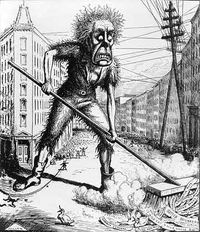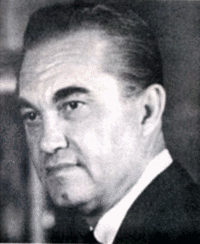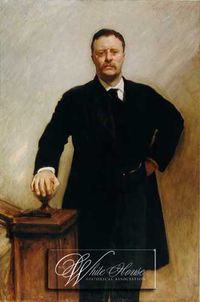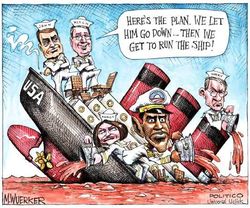Think of this as Volume 17, Number 44 of the newsletter I have written weekly since March, 1997. Enjoy.
 Political analysts of the left, right
Political analysts of the left, right
and center all misunderstand the nature of the Tea Party.
They're not “conservatives,” as we
usually define the term. They're populists.
Populism is as old as the Republic.
Thomas Jefferson ran as a populist in 1800, but eventually accepted
renewal of the U.S. Bank. Andrew Jackson was our most successful
populist, and he killed the bank.
The Panic of 1837, which followed
soon after, killed populism as a governing principle. It only ended after American
imperialism seized the southwest from Mexico, and we found gold in
California.
Populism then merged with
anti-immigrant Know Nothingism. It infected the Democratic Party
through non-slaveowners supporting the Ku Klux Klan. It only became
associated with liberalism thanks to William Jennings Bryan's “Cross
of Gold” speech.
But populism was never about economic theory. It
was and is about relative advantage, about people losing their edge — or assuming they're losing it — against newcomers rising up around them.
Populism, at its heart, is
about a fear of change, the assumption that everything is a zero-sum game. And it's the nature of America that it's not a zero-sum game, that history sides with the newcomers.
Populism also doesn't have to be internally consistent. It isn't.
 Populists were key to Frankin
Populists were key to Frankin
Roosevelt's victory, especially his winning the nomination. But Huey
Long's brand of “every (white) man a king” populism stripped part
of FDR's populist street cred, and Eleanor Roosevelt's racial
liberalism took away the rest.
By 1948, populists were ready to
revolt in both directions, economically through Henry Wallace,
socially through Strom Thurmond. Only the fact that Republicans had
been discredited through wealthy people suffering Hitler
too long let Truman win.
Civil Rights sent the populists into
the Republican camp when I was a kid, the George Wallace campaign
midwifing it and Nixon's “Southern Strategy” embracing it.
Nixon's idea was that the crazy end of populism, its racism and
hatred of “the other” (whoever they turned out to be) could be
contained, and directed, by central control from the top.
That strange tip – Wall Street
Republicans and imperialist-military Republicans riding herd over a
populist Republican base, giving it little more than lip service when
victory was threatened – worked for most of a generation.
 But there's a huge difference between
But there's a huge difference between
populism and Wall Street. There always has been. Populists of the
left and right have agreed on little other than their hatred of Wall
Street. (To the right is John D. Rockefeller Sr. — a lifelong liberal and arch-enemy of the populists.)
The fact that Woodrow Wilson, elected with populist support,
became the father of the Federal Reserve had to do with his skillful
re-direction of that hatred – a network of 12 banks spread around
the country was sold as preferable to rule by the House of Morgan,
which had brought the U.S. out of its panics of 1893 and 1907.
Populists hate concentrations of power,
they fear “the other” (whether an immigrant, a black person, an uppity female or a
gay person), and they're not too subtle about it. They don't need
code words. They accept their basically anti-democratic nature. They
see politics as struggle. Thus an
argument ceases to be an intellectual process, and becomes just
contradiction.
Which brings us to Ted Cruz. Cruz
really thinks he was born to rule. And he has managed to marry Texas'
love of populists – going all the way back to Ma and Pa Ferguson –
to its current Republican fetish. His purpose was achieved by the
recent shutdown – he took up the populist flag and planted it in
the heart of the Washington Republican party.
 Wall Street now has no idea what to do.
Wall Street now has no idea what to do.
It can't disown its populists, because they represent its grassroots,
its foot soldiers. The party has been feeding that base on populism
ever since the Nixon years. On the other hand many Wall Street
Republicans can't afford to walk away from politics, either. Opinions
may change but interests abide. If you don't control the government
you must become a supplicant in order to get what you want
done. This is very hard to take.
This is very similar to what happened
with big business a generation ago. For over a century big money had
been of a liberal bent. Republicans were, until the 1930s, our more
liberal party, and the largest enterprises were quite ready to become
the right wing of the Democratic Party after World War II,
maintaining a preference for slow, progressive change that had become
their habit.
This, in addition to a misunderstanding
of populism, is a second mistake made by today's analysts. We can't
conceive of business as a progressive force. But economic growth, the
organization of vast enterprises, requires change, change over the
objections of people who like things the way they are. Business has
long called this economic change “progress.” You can't spell progressive without progress.
 The switch in party affiliation that
The switch in party affiliation that
began in the Nixon era was largely based on business' preference of
order over disorder. Democrats had become opponents of order.
“If
you don't like cops then the next time you need help call a hippie.”
This played out in millions of homes during the 1960s and 1970s. This
was the heart of the “generation gap” that drove the Nixon Thesis
of Conflict.
But since the 1960s the social
divisions that marked that era have cooled. Most kids love their
parents, and vice versa. Businesses now have women leaders, black
leaders, immigrant leaders and even gay leaders. Progress now means
something more like what it meant in the 1930s – economic
re-organization aimed at profitable growth. It means ordered liberty.
 So slowly, and a bit painfully, CEOs
So slowly, and a bit painfully, CEOs
have been making more common cause with Democrats. Reporters covering
Wall Street don't see it, but it's happening nonetheless. Most CEOs
still call themselves conservative, or independent. But many see the
need for Obamacare, in order to reduce their own health care cost
burdens. Most want to negotiate through our economic problems. Most
are simply not apocalyptic, which is the economic model that has
always been most popular in populist circles, since it keeps people
on edge and activated.
The popularity of populism will wane as
the world doesn't come to an end because of the Federal Reserve.
Conservative businessmen will gradually see a need to make common
cause with Democrats in order to get the progressive change that
means economic growth, although they'll first do it a bit
shamefacedly, as Jeff Immelt of GE did during the President's first
Administration.
It's a process. It's evolutionary, not
revolutionary. To reporters, it's like watching tectonic plates. It's
not something that happens in a news cycle, or even a single election
cycle. But it is happening.
 The first hint of what's to come came
The first hint of what's to come came
Tuesday in Virginia, where a Democrat running on a frankly liberal
ticket beat a Republican-populist who emphasized social issues
throughout his political career. At the same time, a Democrat became
Mayor of New York for the first time in 20 years, and New York will
not sink into the sea as a result. Chris Christie won because few New Jersey Republicans are populist — populists can't afford to live there.
Business is conservative, in that it
likes what it has. But it's progressive in that it always wants more. And it
is always in favor of law and order, which it sees as part of
government's rightful role.
Populists, on the other hand, are now the
ones talking about the need for revolution, about becoming armed to
the teeth, about taking the law into their own hands, about an apocalypse now, which is always bad for business.
“If you don't like cops then the next time you need help, call a survivalist.”
Thus does a new coalition gradually
turn from the liquid of an election night to the solid of an enduring
political Thesis, the Obama Thesis of Consensus. The business of
America is business and when business shifts its political
allegiances, even a little bit, that's the story you need to follow.
Want to know where politics is going? Follow the money.









Refreshing to read a journalist who is able to look at long-term issues. Great piece!
Refreshing to read a journalist who is able to look at long-term issues. Great piece!
Just curious where you see the money going?
Just curious where you see the money going?
Right now the money is sitting in corporate vaults. People who have such money think it’s money, but it’s just potential money. Money only counts when it’s being used.
Right now the money is sitting in corporate vaults. People who have such money think it’s money, but it’s just potential money. Money only counts when it’s being used.